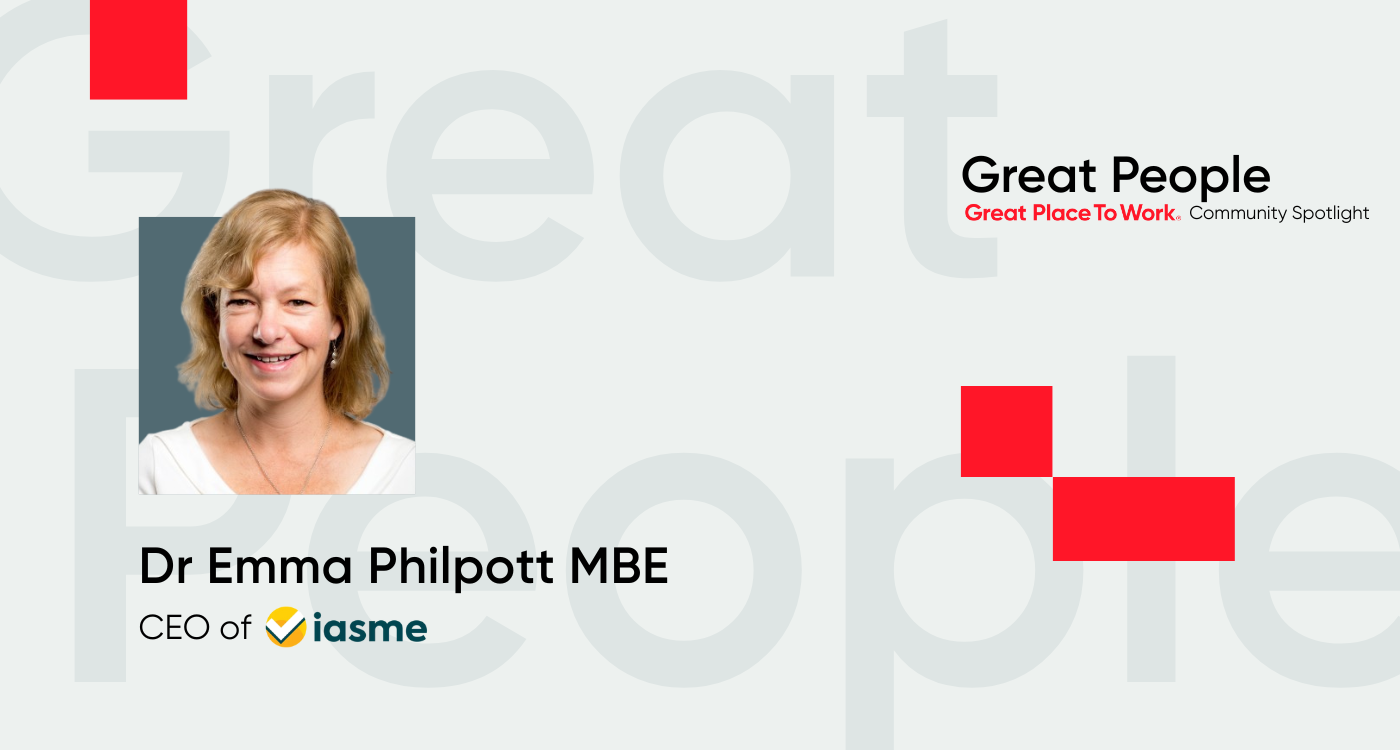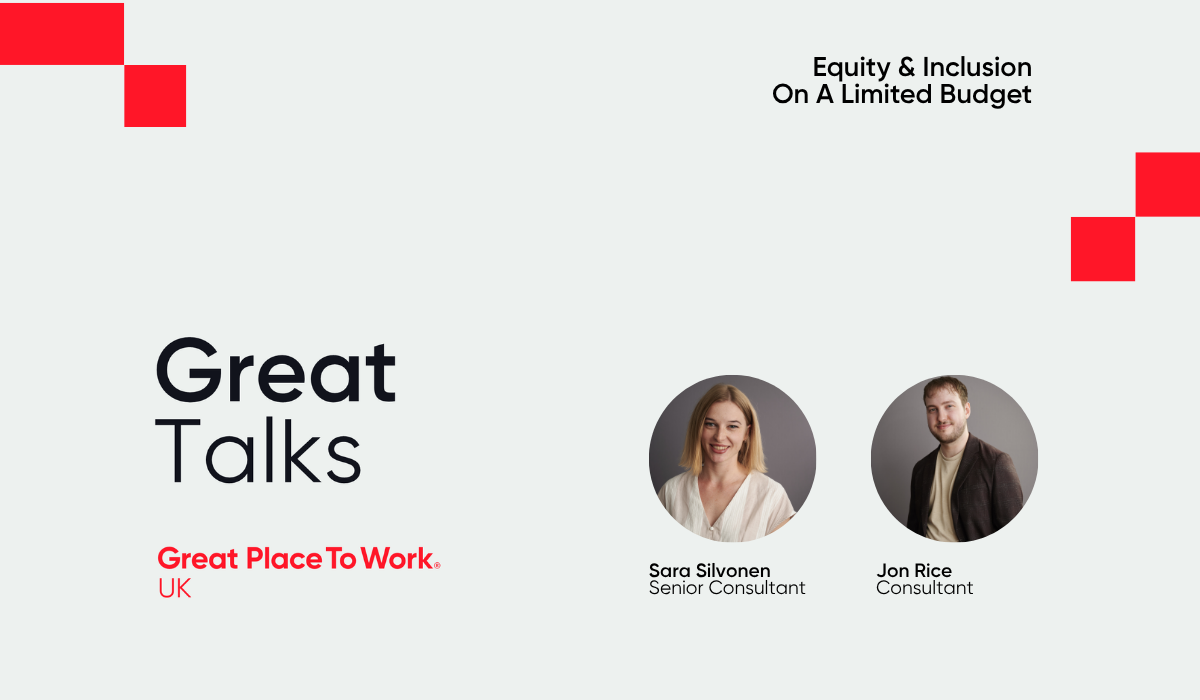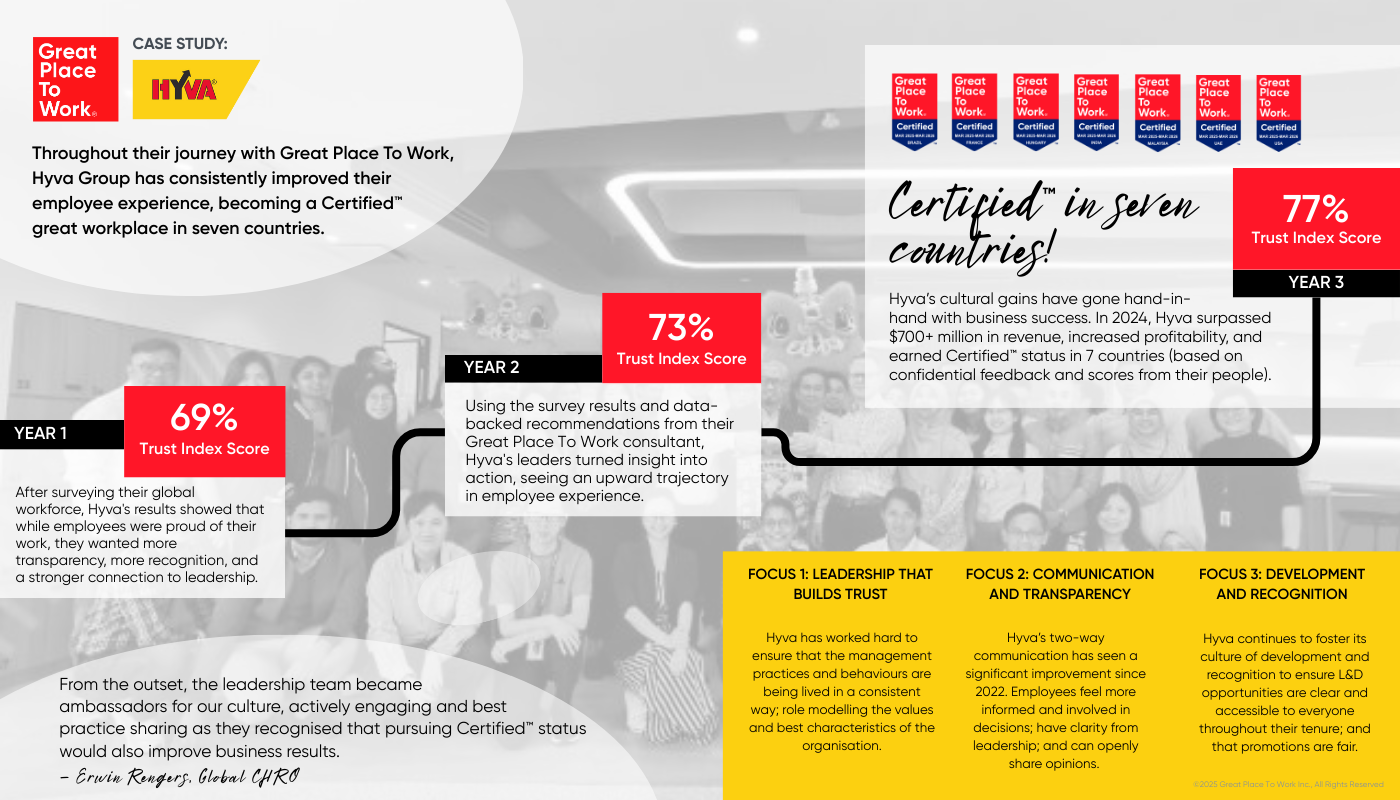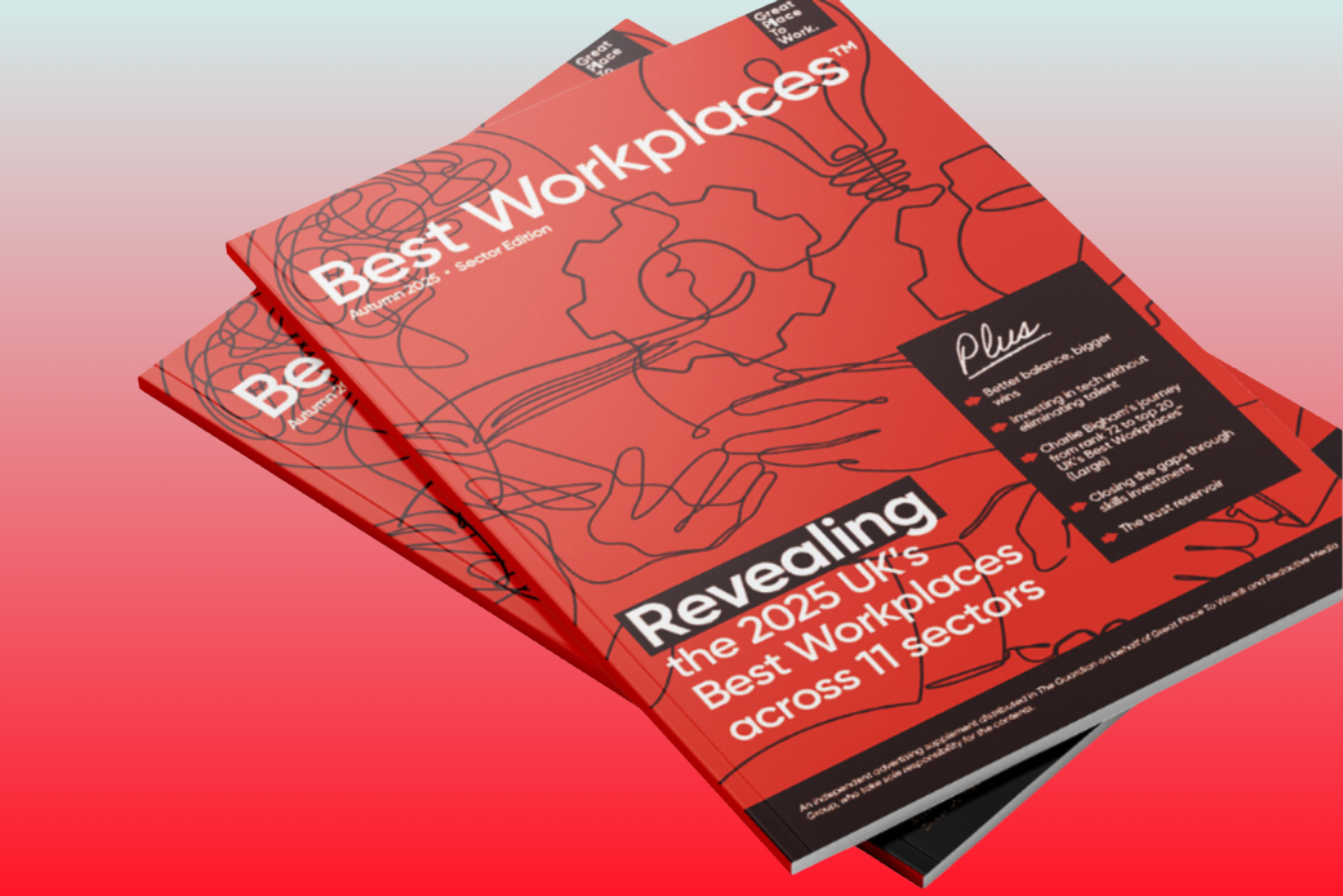Below we share 5 key practices you need for a great employee recognition programme.
Employee recognition has long been a cornerstone of effective management. But today, as the world of work continues to experience unparalleled change and competition for talent escalates, how we show employees that we value them could probably do with some updating too.
Creating a recognition programme is a start — so if you don’t have one, that’s a good first step! — but it’s not something smart organisations do once-off and accept as perfect. Great workplaces constantly re-evaluate the ways they reward employees, ensuring they always meet the needs of both their people and the market.
Below are some of the ways you can develop an inclusive and supportive reward and recognition experience that meets the varying needs of your employees:
1. Remember the “H” in HR
Humans crave recognition from a very early age: from our parents or guardians, teachers, friends and family. So strong is our desire for acknowledgement and positive affirmation, particularly during developmental periods, that we can even perceive a neutral reaction as a negative one.
This continues to hold true as we move into the workplace.
Many organisations found themselves suffering from extended transformation fatigue (“We’ve seen 2 years’ worth of digital transformation in two months,” said Microsoft CEO Satya Nadella) while employees risk burning out from longer hours and struggling to remain motivated.
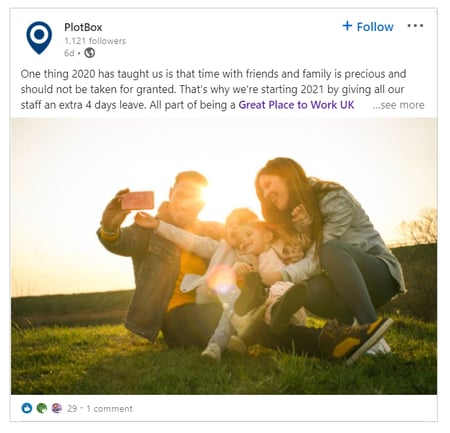 Above: PlotBox – a Great Place to Work Certified™ company – chose to provide 4 extra days leave for their employees in 2021.
Above: PlotBox – a Great Place to Work Certified™ company – chose to provide 4 extra days leave for their employees in 2021.
Our own research has continuously found that people who feel appreciated, receive feedback and affirmation are likely to be more motivated to continue bringing their best to work – even in difficult times.
Similarly, an IBM study cited by HR Grapevine concluded that “top-level HR practise will involve communication personalised to the employee as well as regular pulse surveying and better transparency, the latter underwritten by simply telling employees what’s going on and who will be impacted.”
Using our unique survey platform, hundreds of UK organisations are performing such pulse surveys; studying their employee experience and monitoring engagement to gauge how their people feel about key areas, including the organisation’s recognition culture.
And the cherry on top: HR teams can explore and analyse their survey results in real time, unlocking actionable insights needed to drive positive culture change.
“Reward and recognition is less about novel gifts or perks, and more about asking people how they’re feeling,” explains Seema Shah, Head of Consulting at Great Place to Work® UK.
“Especially during times when we’re all forced to be physically isolated from our colleagues – as we were during the pandemic lockdowns, but also today, as many employees work remotely – recognition of individuals and regular, active listening to your people will be paramount.”
How the Best Workplaces Do it
Here, Gearset (a Certified 'great' workplace and previously a UK’s Best Workplace in Tech™) provides a great example for creating a meaningful employee recognition culture.
The company ensures everyone’s opinions are heard regularly through their anonymous ‘Officevibe survey’. Once a week, team members are asked to complete a short survey, which includes questions across various topics such as ‘Happiness’, ‘Recognition’, ‘Personal Growth’ and ‘Relationship with Peers’.
2. Be timely
Recognition that arrives months after the fact isn’t nearly as meaningful as when received promptly.
The longer it takes for managers to recognise employees, the less likely people will see the affirmations as authentic.
Make employee recognition a priority and have formal systems in place so you can strike while the iron is hot.
How the Best Workplaces do it
As part of their culture initiative, Ryan has developed several methods for seeking and receiving feedback in a timely, meaningful way.
Their Culture Workshops teach leaders how to provide appreciative feedback and constructive feed-forward. To support this, a new feedback feature was opened on the organisation's HRIS system where employees can request “Feedback on Self” from anyone within the firm, and managers can have visibility into the feedback that their direct and indirect reports receive, using this in performance reviews.
For those employees who wish to share their ideas for the business, the global tax services provider also launched their ‘RyanInnovates’ platform where suggestions can be made and viewed by all. Each suggestion appears on a social media style platform that is visible as a company-wide newsfeed, and employees are encouraged to "like" or "dislike" suggestions.
Ideas that achieve 25+ likes, regardless of the total dislikes, are guaranteed to be considered by management and will receive a response. In this way, both leaders and employees are involved in moving ideas forward or voting them down.
3. Go beyond care packages and hampers
Everyone has their own preference or style when it comes to giving and receiving appreciation.
So it's important that leaders take the time to get a clearer picture of the primary language of appreciation (in a work setting) of every individual, then recognise them accordingly.
That said, the customised gifts or packages sent in employees' mailboxes are lovely, but may have been more impactful during Covid times than they are now.
There are countless other acts of appreciation and recognition that can show your people their reward is personalised specially for them.
How the Best Workplaces do it
For example, one financial services and insurance firm we work with tracks employees' CSR engagement through their 'Goodies' recognition programme.
Goodies winners are invited to a special lunch with the Head of EMEA (also available virtually with remote workforces), where they are presented with an award and exclusive gift. The top 5 global champions each receive a trophy, an extra paid day of time off, and a charitable donation of £1,200 made under their name.
Rank #20 on the 2024 UK's Best Workplaces List (Super Large), BUUK Infrastructure's online innovation reward scheme called iHub challenges employees to generate suggestions based on specific business requirements, with an opportunity to be recognised for their suggestions.
For example, the engineering firm's Health & Wellbeing Committee set a challenge for employees to come up with a name and logo that would represent the group. Employees submitted their ideas and the group voted for the winning design, where the winner was rewarded with a wellbeing spa voucher.
4. A little goes a long way
While it's crucial to recognise major accomplishments, everyday thank you’s can motivate employees just as much as (and sometimes even more than) grand awards.
Writing handwritten notes or using your company intranet, Teams or Slack channels to promote the positive behaviours of individuals can help instil a culture of regularly-given employee recognition.
These thank you’s and shout outs don’t have to come from managers alone – some employees may find peer-to-peer appreciation even more motivating.
How the Best Workplaces™ do it
One biopharmaceutical company we work with encourages peer-to-peer recognition of employees who embody "our ways of being" through their ‘Little GEM' (for individuals) and 'Big GEM' (for teams) scheme.
Personalised thank you cards are issued peer-to-peer for anyone to say thank you to a colleague who’d gone the extra mile at work. There is a quarterly prize draw where anyone who received a ‘Little GEM’ can win high street vouchers. All teams awarded a ‘Big GEM’ are rewarded with a free team breakfast at a restaurant.
5. Connect to the bigger picture
This is particularly key when organisations grow or change.
Connecting an individual’s contributions to the success of their team, and the company overall, helps an employee to build a sense of security in their value to the company, motivating them to continue great work.
Share news regularly about how the company is striving to reach its mission and explain how individual employee goals relate to that vision.
Within our own team here at Great Place to Work® UK, employees can nominate colleagues to win one of our ‘Values Awards’ which are linked to our 5 core company values: Care, Expertise, Client Focus, Respect, and One Team. Values Awards winners earn a shopping voucher worth £25.
Do you know if your employees feel appreciated right now?
Do you know if your employees are feeling appreciated? The confidential Trust Index survey is helping thousands of UK organisations measure and track levels of recognition, trust and innovation.
The feature has been adapted from the original article by Claire Hastwell works with Great Place to Work® data and company culture experts to distil the psychology of high-trust workplaces.


